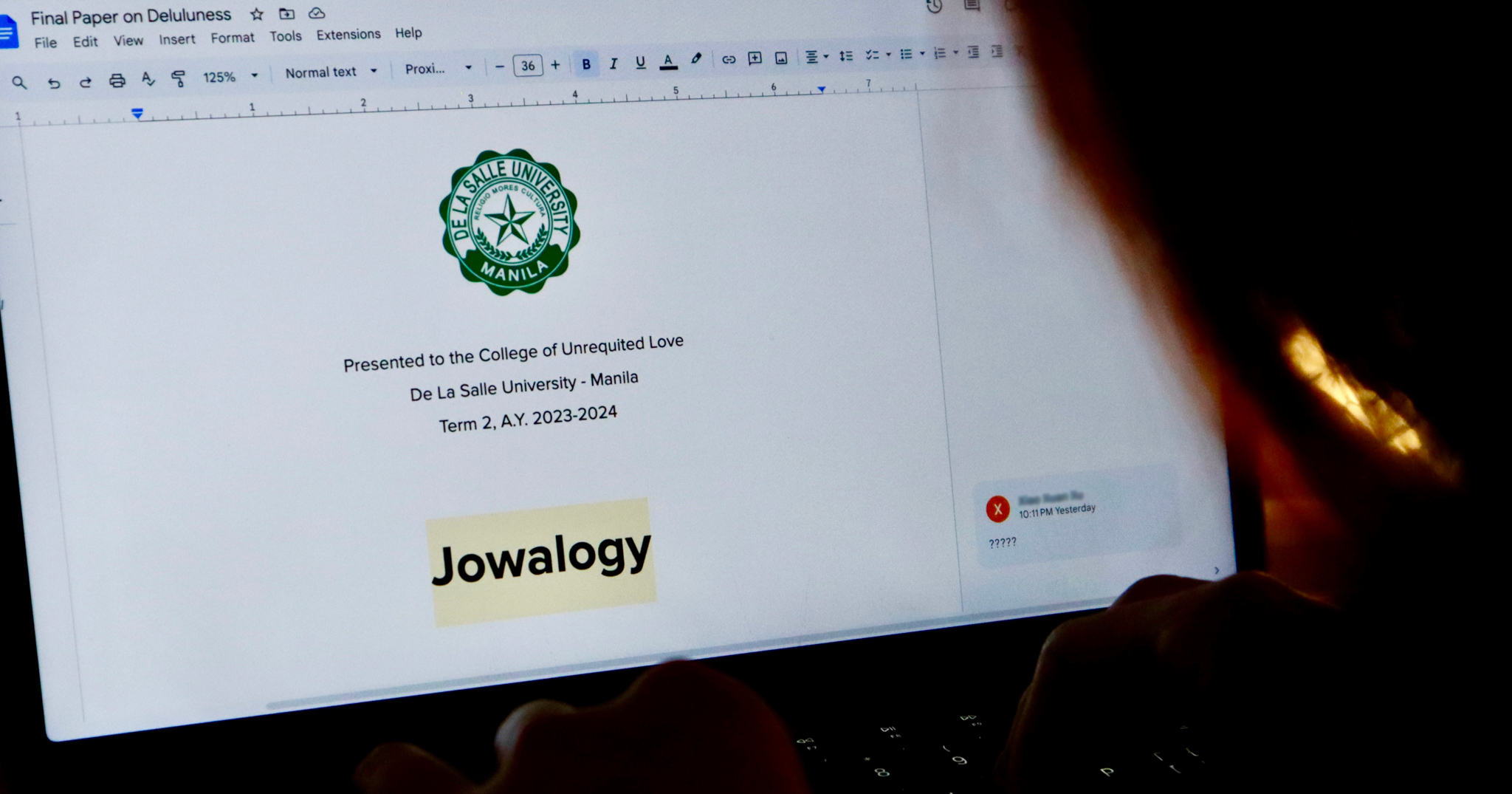For many hopeless romantics, getting rejected by your crush seems to be a naturally occurring phenomenon. This recurring experience has sparked inquiry and interest among researchers across the world, drawing on the age-old question, “Why don’t they like me back?”
The answer to many seemed unclear, until the recent publication of Dr. Sino Banamanko’s journal Why you’re still single: An analysis of crushes and loneliness in 2023.
The journal has since garnered global attention for its collection of breakthroughs from multiple researchers in Jowalogy, the study of relationships. The collection extensively details the science behind your rejection and provides explanations as to why you are still single.
They’re just not into you
While several people may be quick to point out your red flags as the reasons for your unrequited love, sometimes, the causes for rejection are simply because you cannot force “the vibe,” a term coined by Dr. Gani To Talagako, one of the authors under Banamanko’s journal. It describes individuals who effortlessly develop a strong connection with one another because of their common interests, resulting in a relationship with “matched wavelengths of energy.”
In the article Examining the causes of unrequited love among adolescents: A systematic review, Talagako claims that around 95 percent of failed relationships among individuals between the ages of 17 and 22 were due to problems that surfaced from them liking their crush more than their crush liked them, often resulting in misinterpretations and crushed expectations. He asserts that there was a significant lack of the vibe in these situations, which is crucial for the energy of the two parties to be matched and, therefore, reciprocated. Moxie* (II, HUMBIO) recounts a similar experience when she rejected her suitor: “[He’s] giving Aries vibes, Aries are bad for us Pisces people.”

Many studies examining this harsh reality have led researchers to call this the “Hindi Ka Niya Lang Gusto” phenomenon, which is Filipino for “they’re not just that into you,” wherein the primary reason for unrequited love is simply because they don’t want you, or at least, not in the way you hoped they would.
Common signs that have been observed include never asking about your personal life or your interests, forgetting important things about you, expressing disinterest in making plans that only involve the both of you, and refusing to connect with you on an emotional level. Miguel* (I, BSCE), when asked in an interview, reflects on a similar experience, “Sino ba naman ako para isipin mo?” Put nicely, they see you as a great friend. Put truthfully, they’re just not that into you.
(Who even am I for you to think about?)
Staying delulu
Despite the obvious hints that you and your crush can’t seem to hit it off, our brains process this information differently as a way to maintain sanity. “Delulu” is how Dr. Mio Ayokonamagisa describes this phenomenon, which implies “delusional” and serves as the basis for the saying, “love is blind.”
Being delulu has two stages: the stalking stage and then the metamorphosis stage. The former begins when you start following your crush on social media platforms and in real life to learn all the things they love. The latter occurs when you change yourself so that they find you more attractive and likable, including winning competitions and adopting their hobbies.
Its foundation lies within the “umaasa” concept, which jowalogists define as the hope driving a person to get their crush to look at them with heart eyes. While this can increase a person’s stalker-like tendencies and joblessness, Ayokonamagisa explains that it can also significantly inspire them to do great things—like passing the DCAT and getting into DLSU since their crush goes to school there—in the name of love. This effect is prevalent among teenagers experiencing the woes of romance, with 89 percent of them successfully maintaining their sanity.
If your crush is genuinely not into you, being rejected or just “friend-zoned” will dump you to the darkest and ickiest depths of your own personal hell. This realization leads to the destruction of the delulu effect, which can cause people to spiral into madness. No matter how much you try to woo them, it will always end with “I like you too, but as a friend.”
When people reach this critical point, Ayokanamagisa says they often listen to Taylor Swift’s “You Belong With Me” all night long and lose interest in everything else, including themselves. The only cure for this is the occurrence of a new crush, becoming an endless cycle until delulu becomes trululu.
Within the delulu stages, the “papansin” behavior seems to arise. It is characterized by incessant posting on social media or trying to show up in a place where the crush might be, trying to get their love and attention. Miguel shares that one of the applications of this behavior he utilized is hiding Instagram stories from all followers except for the crush and posting an “anonymous” question-and-answer (Q&A), hoping to get insights from the subject.
More often than not, the Q&A method works, but not toward your crush. In the interview, Miguel garnered insights from multiple other people wanting to get to know him. Initially, he dabbles with this attention, but in the end, he realizes that this is not what he wants. “The vibe is just different when you’re into that person you know,” Miguel explains, rejecting and friend-zoning others, becoming the rejector.
Dr. Dirin Tayosa Hu-Lee also claims in his own study that delulu is exacerbated by the “sana-all” effect—interestingly unique to Filipinos. Hu-Lee posits that globalization may have fueled newer generations of Filipinos to keep comparing what they have with others, leading to the sana-all. It is a phenomenon encompassing all aspects of life, from achievements to romantic relationships. The constant reminder that someone has a lover while you do not increases the intensity of the delulu effect, making you more eager to learn about your crush and make them see you as a potential life partner.
Copium
Miguel, recalls apologizing to his crush after being rejected. In a screenshot of the conversation, the message indicated: “Sorry kung hindi ako six feet (sic) tall, funny, pogi at matalino na chinito na higher batch na may kotse.”
(Sorry, I’m not a six-feet tall, funny, handsome, and smart chinito that’s also from a higher batch and owns a car.)
For people like Miguel, getting rejected does not mean the end of the world. For instance, it is possible to improve “the vibe” by getting to know themselves and their crush more and not rushing the relationship. One can also practice self-care activities like touching grass and mindfulness to address the lack of attention the crush provides. In the end, focusing on yourself first is the key to coping with your crush not liking you back.
When asked to share a message to those whose crush doesn’t like them back, Banamanko advises, “Give up on hope. Science has spoken, [and] you’re just not meant to be. Love yourself [instead].”
*Names with asterisks (*) are pseudonyms.
This article was published in The LaSallian‘s Spoof 2024 issue. To read more, visit bit.ly/TLSSpoof2024.



